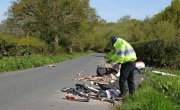22m pieces of furniture thrown out every year in the UK
The North London Waste Authority (NLWA) has released new research into the UK’s throwaway culture, showing that fewer than one in 10 people attempt to repair their broken or damaged furniture.
Although almost half of those surveyed said they would like to learn how to repair their possessions, 22 million small items of furniture, more than 11,000 bicycles and over 28 million toys are thrown away each year.
Nearly half of consumers in NLWA’s survey toss these discarded belongings in with non-recyclable general waste, meaning the UK has had to double its residual waste treatment capacity in the last 8 years, from 6.5 million tonnes to 13.5 million tonnes.
The survey respondents disposed of these possessions for a variety of reasons: 23 per cent said it was the easiest thing to do, another 23 per cent said they weren’t sure how to dispose of these items, whilst 20 per cent said it was cheaper and easier to replace items rather than repair them.
Recycling old items rather than buying new ones helps preserve raw materials, whilst simultaneously saving money and reducing waste; 36 per cent of survey respondents did feel that recycling is the right thing to do with broken items. But while recycling is preferable to throwing something into general waste, it is better to avoid waste all together – and that’s where NWLA’s Repair Cafes come in.
NLWA will be launching a series of new, free Repair Cafes in North London over the next five months, where consumers can learn new repair skills whilst having a cup of tea.
At 21 pop-up events, repair specialists will be on hand to provide free repair consultations and training to residents keen to learn how to mend their old belongings. Clothing waste charity Traid and clothes repair company Xsazia will assist with textile objects, whilst upcyclers Thriftys Retro will assist with transforming old furniture and Cycle Confident can help with bicycle repairs.
Councillor Clyde Loakes, Chair of NLWA, said: “As society becomes more aware of the impact of our waste on the environment, we believe there is an appetite for moving away from the culture of habitually binning – or even recycling – and buying new.
“But many of us don’t have the skills to extend the life of household items – only 15 per cent of those we asked in our survey said they had repair skills. That’s why we’ve launched our programme of Repair Cafes – we want to encourage people to see the value in all items and to consider having a go at repairing things before giving up on them.”
Three Repair Cafes will be held in each of the seven north London boroughs that make up NLWA (Barnet, Camden, Enfield, Hackney, Haringey, Islington and Waltham Forest), providing residents with skills that will save them money and reduce waste.
Launched in the run-up to the second annual International Repair Day on 20 October, the NLWA’s repair project is one of many similar initiatives which are growing in popularity in the UK, such as the Restart Project, which is focused on helping people to repair their electronic items and small household appliances.
More details about the NLWA campaign, as well as simple tips on how to repair items, can be found on the Repair Cafes website. Local residents will be able to register for a 30-minute repair slot online prior to going to an event to ensure they get a place.








